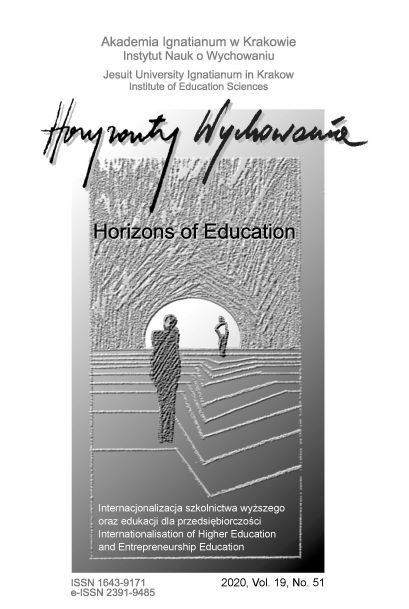Editorial: Internationalisation of Higher Education and Entrepreneurship Education
Abstrakt
Alongside performing their traditional functions of educating and conducting research, contemporary universities face a range of new challenges. One of them is to become more involved in the process of social and economic development, which can be achieved by e.g. establishing fruitful relations with the business sector. The changes that address this need are connected with the implementation of the concept of an entrepreneurial university. The aim of such university is to educate future employees able to meet the expectations of the labour market not only in the area of specialised professional knowledge but also in the area of skills, competences, and entrepreneurial attitudes. Entrepreneurship education – offered at its different levels – is one of the most significant challenges of the contemporary education system. Entrepreneurship education shapes entrepreneurial competences, skills and attitudes through various forms of education, activating teaching methods and aids that increase students’ involvement in the teaching and learning process. Communication and information technologies are increasingly used in the entrepreneurial approach to learning to support its implementation.
Bibliografia
Copyright (c) 2020 Horyzonty Wychowania

Utwór dostępny jest na licencji Creative Commons Uznanie autorstwa – Bez utworów zależnych 4.0 Międzynarodowe.
Uwagi dotyczące praw autorskich
Autorzy publikujący w tym czasopiśmie wyrażają zgodę na następując warunki:
- Autorzy zachowują prawa autorskie, przyznając czasopismu prawo do pierwszej publikacji swojego tekstu jednocześnie zarejestrowanego pod numerem licencji CC BY-ND, która pozwala innym na korzystanie z tego tekstu z uznaniem autorstwa tekstu oraz pierwotnej publikacji w tym czasopiśmie.
- Autorzy proszeni są o nawiązywanie odrębnych, dodatkowych porozumień wynikających z umowy, dotyczących dystrybucji opublikowanej w czasopiśmie wersji tekstu nie na prawach wyłączności (np. opublikowanie go w repozytorium instytucji lub w innym czasopiśmie), z potwierdzeniem pierwszej publikacji w tym czasopiśmie.
Wyraża się zgodę i zachęca autorów do publikacji ich tekstu w Internecie (np. w repozytorium instytucji lub na jej stronie internetowej) przed lub podczas procesu składania tekstu jako, że może to prowadzić do korzystnych wymian oraz wcześniejszego i większego cytowania opublikowanego tekstu (Patrz The Effect of Open Access). Zalecamy wykorzystanie dowolnego portalu stowarzyszeń badawczych z niżej wymienionych:





